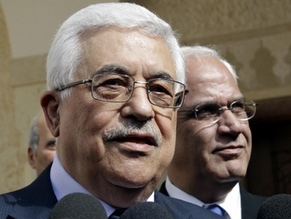|
World Jewish News

Palestinian leader Mahmud Abbas speaks to reporters in front of Palestinian chief negotiator Saeb Erekat (R), after his talks with King Abdullah II of Jordan in Amman on January 26, 2012. Photo by: AFP
|
Erekat to Jordan FM: Peace talks won't resume without settlement freeze
07.03.2012, Israel Palestinian leaders told Jordan's visiting foreign minister on Wednesday that they will not resume Mideast peace talks without an Israeli settlement freeze.
Jordan foreign minister, Nasser Judeh, explored the possibility of resuming peace talks between Israel and the Palestinians in a meeting with Palestinian President Mahmoud Abbas.
Chief Palestinian negotiator Saeb Erekat said that after Judeh's visit "won't be followed by negotiations unless Israel stops settlement activities" in the West Bank.
Staunchly pro-Washington, Jordan has considerable sway as one of the Palestinians’ most important allies. In January, Jordan hosted low-level Israeli-Palestinian talks that broke down in acrimony.
Erekat’s comments came after on Tuesday a top U.S. military official that a continued stall in peace talks between Israel and the Palestinians exacted a "steep price" and complicated the activities of forces under his command.
"A peace agreement between Israel and the Palestinians will foster stable public support among our partners in the region for American initiatives," Marine Corps Gen. James Mattis, head of the Central Command claimed, adding that such a deal would “reinforce regional cooperation."
He added that an agreement would also hamper the efforts of extremist groups, saying: "Our obligation to future generations is to do our utmost to solve this vexing problem, which throws oil on the flames of extremist ideologies."
Haaretz.com
|
|
